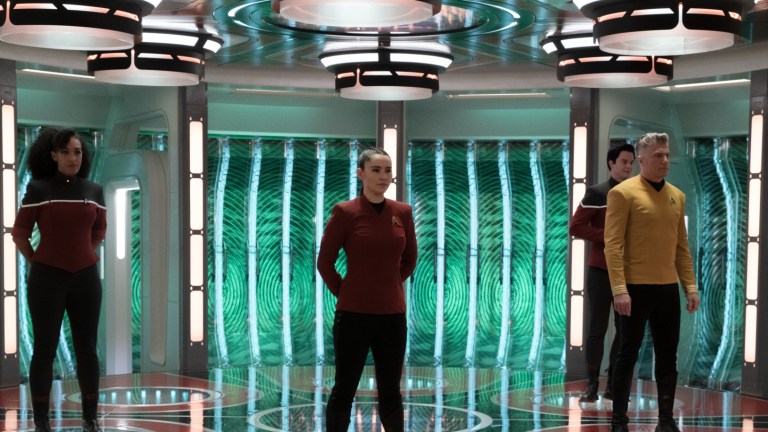It’s Time To Admit That Star Trek Needs Longer Seasons
A long-time Star Trek producer has called short Star Trek seasons "Tinder relationships." He's got a point.

For all that the streaming era has given us, there are still a lot of genuinely annoying things about it, most notably when it comes the business and production of TV. Now, six to eight-episode seasons of popular series are commonplace, usually dropped as single-release binges instead of spread out over weeks, and it’s not unheard of for it to take multiple years for new batches of episodes to arrive. Gone are the days of extended seasons, regular release schedules, and weekly watercooler debriefs online (or in person, what a concept) with friends.
Even a franchise giant like Star Trek isn’t unaffected by these changes. While we’ve had more Trek properties than ever before in recent years, the series has struggled to adapt to the streaming format, and the modern era of the show looks quite a bit different than its predecessors once did. Ten-episode seasons are now the new normal, and no Paramount+ series has yet managed to air more than five of them.
Star Trek: Strange New Worlds, the most critically acclaimed installment of the franchise in a very long time, will end with a truncated fifth season of six episodes. This means that it’ll barely eke past the more universally criticized Star Trek: Enterprise in terms of runtime. (And will fall well short if you consider total episode count.) And it’s probably time to question that fact. Sure, the Trek franchise looks better than it ever has. But what are we losing in this transition to shorter seasons and lower episode counts? Is it time to think about whether the show should go back to producing longer seasons?
Brannon Brega says yes. And he should know, since he’s written more episodes of Trek than anyone else. He has writing credits on over 100 episodes and two feature films. He began his career as an intern on Star Trek: The Next Generation, served as showrunner on Star Trek: Voyager, and was one of the creators of Star Trek: Enterprise. If anybody is in a unique position to weigh in on how the franchise has changed over the years — and in the switch from broadcast to streaming — it’s him. And in his view, something has to give.
Speaking at the recent STLV: Trek to Vegas convention, Braga argued that the rise of streaming means that TV doesn’t have the same long-term relationships with viewers as it once did. Which, again, makes sense when fans are only checking in on their favorite shows and characters for a brief period every couple of years.
“I look at this audience, and I think you’re here because you had a long-term relationship with Voyager,” Braga said during a convention panel. “Voyager was 26 episodes a year. Some of you probably keep it on because it’s cozy, and that’s the kind of relationship you had. A lot of shows now are Tinder relationships — eight episodes every two years, I don’t think so. That’s not going to be something you necessarily pass on to your kids. And I think that’s a loss.”
He’s got a point. Perhaps referring to fans’ emotional connections to shows like Strange New Worlds (which is excellent) or Star Trek: Picard (which is… less so) as “Tinder relationships” is a bit harsh. But in a franchise like this one, shorter seasons mean that series can often struggle to find a balance between one-off adventures and larger arcs, particularly the sort of serialized storytelling that gives the emotional journeys of the characters at their centers real meaning. How much harder would Captain Batel’s sacrifice in the Strange New Worlds season 3 finale have landed if we’d had some time to really get to know her—and genuinely invest in her relationship with Captain Pike?
Granted, the business of streaming means a shift like this is extremely unlikely. (Behind-the-scenes scuttlebutt hints that Strange New Worlds was probably lucky to get a reduced episode count final season to wrap up its story. Everything’s expensive, executives are risk-averse, and the folks who are actually watching all this content are often treated like afterthoughts. But isn’t it nice to dream about a proper, 22-episode season following Pike’s Enterprise anyway?
